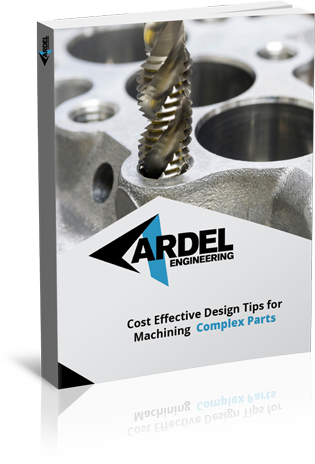Here at Ardel Engineering, we spend a lot of time with stainless steels, but not every grade is created equal. Some cut smoothly, others put tools through their paces, and a few land in that rare category of being both tough and versatile. 17-4 PH stainless steel in the H900 condition fits squarely in the last group.
What 17-4 H900 Really Means
17-4 is a Chromium-Nickel grade of stainless steel, so the “17” refers to its chromium content, and the “4” refers to its nickel content. “PH” stands for precipitation hardening, a treatment that changes how the alloy behaves under stress. By aging the material at about 900°F, we get what’s called Condition H900. The result of this thermal processing (aging) is stainless steel that is significantly harder and stronger than in its annealed state, without giving up corrosion resistance.
So, what makes it stand out?
- Strength Under Pressure: Tensile and yield numbers that outpace many other stainless grades.
- Hardness That Holds: Typically around 44 Rockwell C, which resists wear.
- Corrosion Resistance: It keeps its integrity in marine and chemical environments.
- Stability: Less distortion when exposed to mechanical loads or temperature changes.
For industries where equipment failure is not an option, 17-4 PH H900 is a natural choice.
Why Machining Gets Complicated
There’s no free lunch when it comes to alloys. The same traits that make 17-4 H900 so desirable also make it more stubborn to machine. Compared to softer grades, cutters meet more resistance, and heat builds quickly at the tool interface.
Ardel has refined our approach to handle this challenge:
- Tool Selection: We rely heavily on carbide with advanced coatings.
- Careful Feeds and Speeds: Pushing too hard shortens tool life, so we balance pace with accuracy.
- Coolant Control: Flooding with high-pressure coolant keeps surfaces cool and helps chips clear.
- Secure Workholding: Rigidity reduces chatter and keeps tolerances tight.
That combination allows us to deliver repeatable results, even on complex geometries where mistakes aren’t acceptable.
Industries That Depend on 17-4 PH H900
Every time you step into an airplane, chances are parts around you are made from this material. Aerospace manufacturers count on it for shafts, fasteners, and structures where strength and weight savings intersect.
Defense companies specify it for firearm components and assemblies exposed to rugged field conditions. In medical device production, it shows up in surgical tools that face repeated sterilization cycles. And in heavy industry, it’s trusted in valves, pump shafts, and machinery that endures constant stress.
In each case, the alloy offers a balance that simply works: strong enough, resistant enough, and reliable over time.
Why Ardel Is the Right Partner
Plenty of machine shops can cut stainless steel, but experience matters when the material is as demanding as 17-4 PH in H900 condition. Our team understands how it reacts at the spindle, how to hold tolerances without excessive scrap, and how to do it efficiently for production runs.We combine that with:
- Modern CNC equipment capable of multi-axis precision.
- Engineers who know how to adapt designs for manufacturability.
- Inspection processes that verify every part meets spec.
- Flexibility to handle prototypes or full-scale production.
We pride ourselves on delivering reliable components that fit directly into your application.
Moving Forward With Confidence
For companies designing aerospace parts, medical instruments, or industrial machinery, 17-4 PH H900 is often the alloy of choice. At Ardel Engineering, we make sure it performs exactly as intended. Our job is to turn that tough stainless into finished parts that pass inspection the first time and every time after.
contact us today to learn how our machining expertise with 17-4 PH H900 stainless steel can support your next project.

